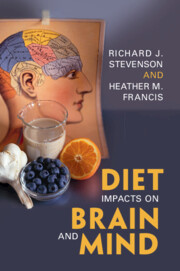Book contents
- Diet Impacts on Brain and Mind
- Diet Impacts on Brain and Mind
- Copyright page
- Contents
- Figures
- Tables
- Preface and Acknowledgements
- Chapter 1 Introduction
- Chapter 2 Pregnancy, Infancy and Development
- Chapter 3 Acute Effects of Food Intake
- Chapter 4 Chronic Effects of Food Intake
- Chapter 5 Dietary Neurotoxins
- Chapter 6 Neuroprotective Effects of Diet
- Chapter 7 Food-Related Drugs and Food as a Drug
- Chapter 8 Starvation and Caloric Restriction in Adults
- Chapter 9 Essential Nutrient Deficiencies in Adults
- Chapter 10 Implications and Conclusions
- References
- Index
Chapter 8 - Starvation and Caloric Restriction in Adults
Published online by Cambridge University Press: 02 February 2023
- Diet Impacts on Brain and Mind
- Diet Impacts on Brain and Mind
- Copyright page
- Contents
- Figures
- Tables
- Preface and Acknowledgements
- Chapter 1 Introduction
- Chapter 2 Pregnancy, Infancy and Development
- Chapter 3 Acute Effects of Food Intake
- Chapter 4 Chronic Effects of Food Intake
- Chapter 5 Dietary Neurotoxins
- Chapter 6 Neuroprotective Effects of Diet
- Chapter 7 Food-Related Drugs and Food as a Drug
- Chapter 8 Starvation and Caloric Restriction in Adults
- Chapter 9 Essential Nutrient Deficiencies in Adults
- Chapter 10 Implications and Conclusions
- References
- Index
Summary
This chapter examines the neurobehavioural impacts in adults of both starvation (food restriction/cessation) and energy restriction for life extension. Section 8.2 covers animals, finding that restriction causes hippocampal damage and stress responses. Section 8.3 covers humans. Short-term fasting (<1 week) has limited cognitive effects, primarily increasing attention to food. Long-term fasting (weeks-to-years) has been studied naturalistically (e.g., famines, hunger strikes) and in the lab (e.g., Minnesota starvation study). Findings are convergent, with dramatic increases in appetite, low mood and egocentricity. The neural basis of these effects can be studied indirectly in people with anorexia nervosa, although this is complicated by pre-existing brain changes that may dispose to this disease. The impacts of cachexia and aging are also examined, alongside the longer-term impacts of food restriction post-recovery. Part three examines the animal and human energy restriction literature. While lifespan extension can occur in small mammals, the evidence in primates and humans for beneficial effects is equivocal.
Keywords
- Type
- Chapter
- Information
- Diet Impacts on Brain and Mind , pp. 250 - 306Publisher: Cambridge University PressPrint publication year: 2023



